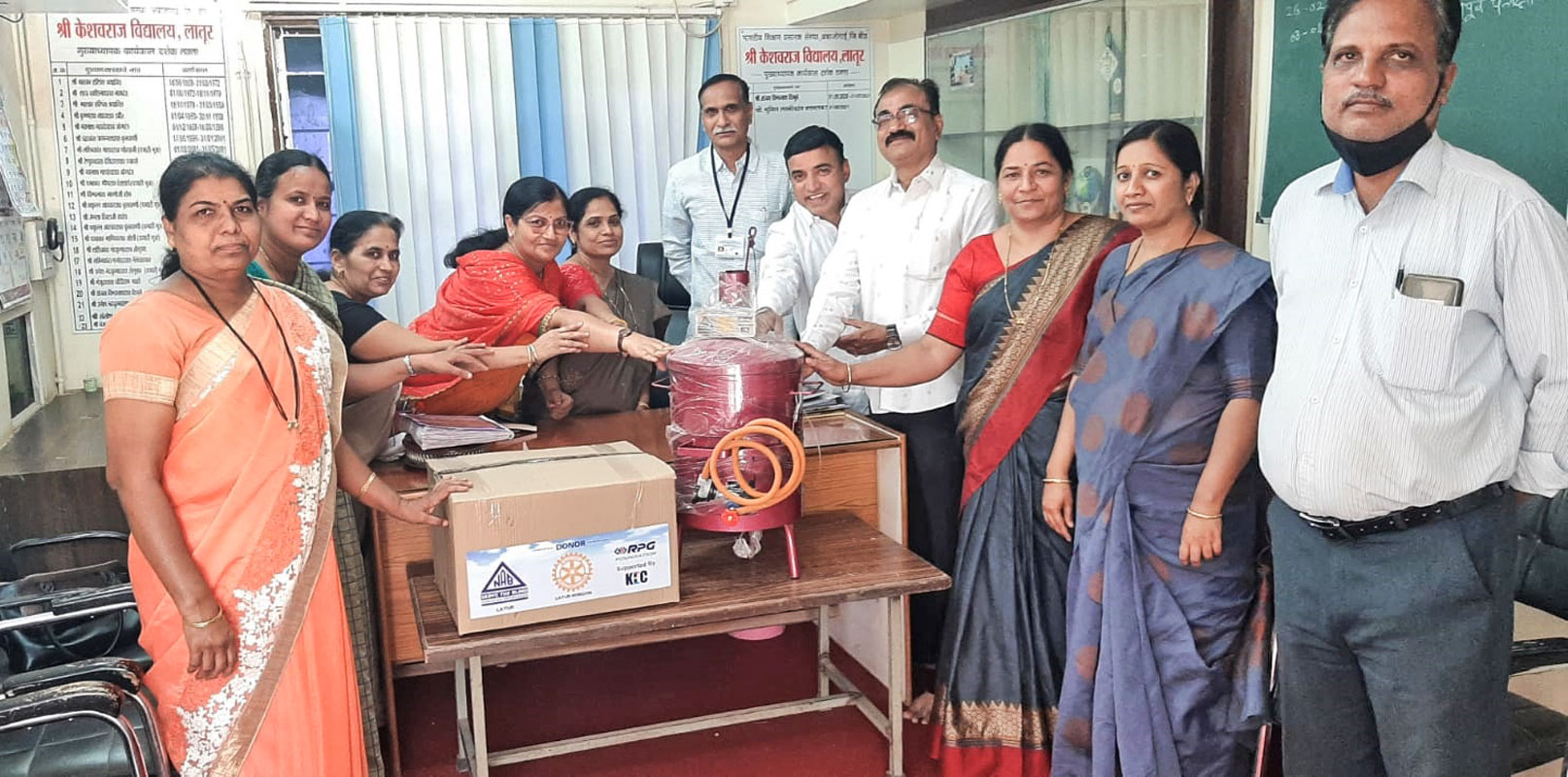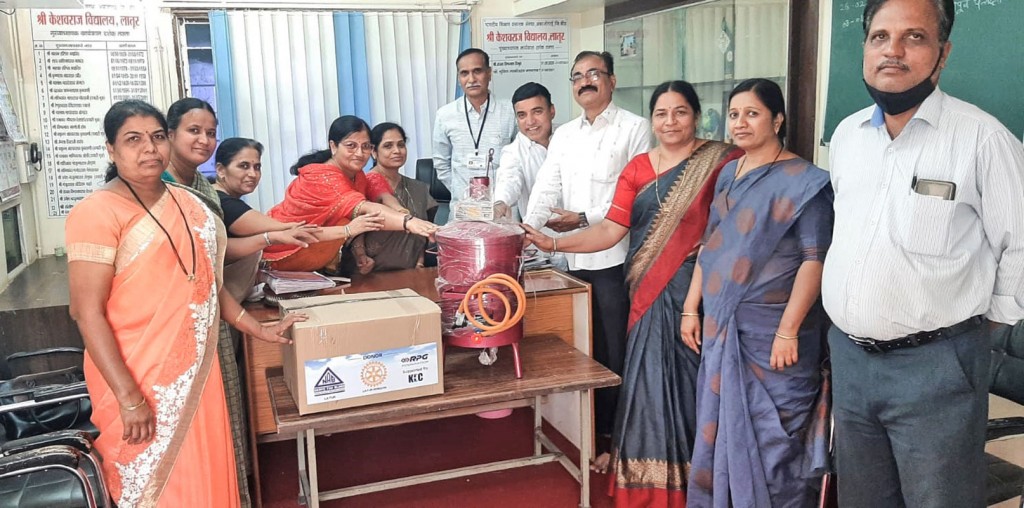About four years ago, when PDG Vijay Rathi, RI District 3132, was on one of his frequent visits to Latur in Maharashtra, he was curious about the observance of menstrual hygiene in its rural belt. “We own some farmland, and I was travelling with my daughter and granddaughter; it’s a delicate subject for a man to discuss with women, particularly in rural India, so I asked both of them to chat with the women and find out something about what the women, particularly adolescent girls in schools and colleges in that belt, use while menstruating.”

He was shocked to find that “even in today’s advanced age, many females were oblivious to the use of sanitary pads, and were using age-old conventional things such as old cloth, actually rags, grass ash, wooden dust and sometimes even mitti (earth) during those difficult days.”
Interested in projects related to health, and a Rotarian for 52 years — he is a member of RC Latur Horizon — Rathi decided to do something to change this state of affairs. “I knew that the root causes of this unhygienic, and extremely dangerous practice, were poverty, ignorance, tradition and lack of knowledge of the health hazards that could result from such a practice,” he recalls, in an interview to Rotary News.
As the passion to do something to help these women/girls possessed him, “I discussed with my joint family that I wanted to do a project to make sanitary pads. As we have some family land, I proposed to them that we donate one hectare (2.5 acres) of our land in that area to set up a unit for making sanitary pads.”

Once the family came on board and the decision to donate the land — which is now worth ₹50 lakh — was made, Rathi took the project proposal to the National Association for the Blind (NAB), where he is a member of the executive committee. The Board decided to grant some funds to construct a shed of 4,000 sqft to set up a unit to make sanitary pads on his land. Village women, and a few blind persons in the village, were trained to make the pads, and once the machinery and other infrastructure were in place, production of sanitary pads began.
Seven local persons have got employment in this unit, which has produced over 1.5 lakh pads till now. The pads have all been distributed free of cost to the needy. Members of RC Latur Horizon have got involved in the project and help in creating awareness about how crucial menstrual hygiene is for women’s health and well-being.
Manmohan Sarda, a former Rotarian, who has got involved in this project as a volunteer, says that once the local Rotarians of Latur got involved in the project; “we gave them the pads free of cost, and the Rotarians motivated the women to use these pads, understand their health benefits, and slowly the acceptance of sanitary pads has started growing in the region.”
He left his club a few years ago “as it was not active and was hardly doing any projects.”
Disposal blues
Once the sanitary pads production unit was in place, next came the question of disposal, because most often, used pads are either dropped in toilets which can choke the drainage system, or are thrown in dustbins or just out in the open, creating messy garbage and harming the environment.
Rathi explains that the conventional incinerators available in the market work on electricity and the areas where these machines needed to be placed for proper disposal of the used pads had erratic power supply at best, with long hours of load shedding.

His mind started working on ideas for alternative use of energy to work the incinerators; at first he thought of firewood, but then that would result in an ecological imbalance. “My son is an engineer and fabricator, and he runs a paper mill in Latur. Along with a couple of his colleagues he set about the task of making an incinerator that was user-friendly and had an energy source other than electricity.”
Not only was the power source a problem; the other tricky part was that the common incinerators used for the disposal of sanitary pads have “some six knobs, and even if one of them stops working, the machine will not work. They came out with a model that can work on firewood, LPG, and even agro waste, plenty of which is available in rural areas. The capacity of the electrical unit is only about one-third of our unit, whereas its cost is five times higher! (This incinerator costs around ₹5,000). Even the guarantee or warranty of the former is limited, compared to our incinerator,” adds Rathi proudly.
Under this project, until now, 205 incinerators have been manufactured and distributed free of cost through Rotary clubs in RID 3132 to schools, women’s organisations, NGOs, gram panchayats and others. On how the money was raised, he says, “When Suhas Vaidya was our DG, he was very impressed by this project and gave money from the district designated funds for 44 incinerators. Kishore Lulla, an AKS fellow and a member of RC Sangli (RID 3170), donated ₹1 lakh for this project, the RPG Foundation gave ₹7 lakh, and other organisations from Mumbai have donated too.”

Asked why they didn’t go for a global grant, the PDG smiles and says, “Of course we tried very hard to get a GG. We found a foreign partner and met all the requirements, but our grant was rejected, maybe on some technicality.”
But undeterred by this rejection, which came a while ago, the Rotarians have worked hard to raise the money and in Feb 2022, at an event, sanitary pads and incinerators were distributed to various organisations.
Education Commissioner of Maharashtra Vishal Solanki, RID 3132 DG Omprakash Motipawale, RPG Foundation and other donor organisations’ representatives, and zilla parishad officers and local citizens, along with Rotarians, participated. Rathi adds that they have already applied “for a patent for our incinerators, and are hopeful of getting it soon.”
Rotary clubs which wish to replicate this project can contact PDG Rathi at 9404273778.






